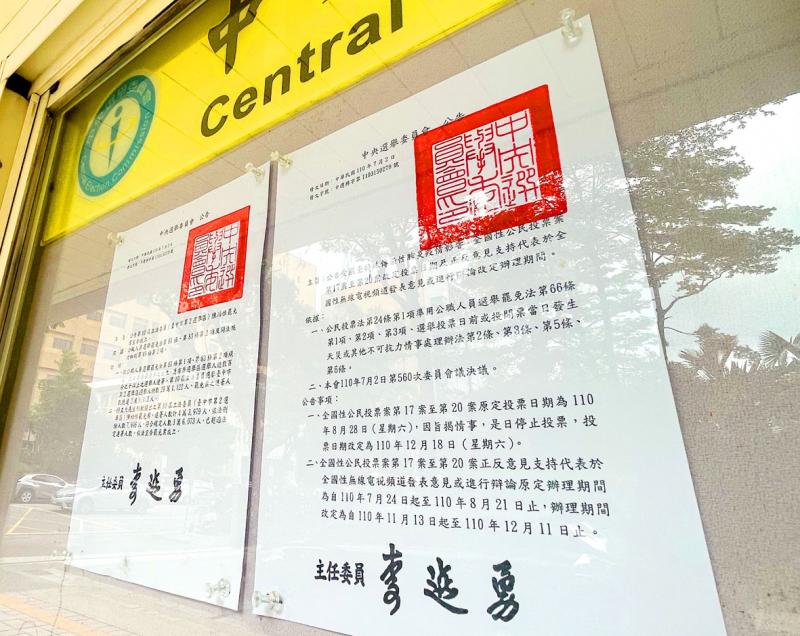The Central Election Commission (CEC) yesterday postponed next month’s referendum to Dec. 18, due to the COVID-19 outbreak.
The vote, originally slated for Aug. 28, would be on proposals to protect the algal reefs in Datan Borough (大潭) in Taoyuan’s Guanyin District (觀音), bar pork imports containing ractopamine, combine referendum votes with national elections and restart work on the mothballed Fourth Nuclear Power Plant in New Taipei City’s Gongliao District (貢寮).
Mobilizing nearly 270,000 workers and volunteers to help at 17,479 voting stations would be problematic under a nationwide level 3 COVID-19 alert, the commission said.

Photo: CNA
The alert, extended until July 12, prohibits meetings of more than five people indoors and 10 outdoors, and requires that schools, community centers, temples and other places where large groups gather close, which would hinder the commission’s ability to prepare for the referendums.
The CEC cited Article 24 of the Referendum Act (公民投票法) and Constitutional Interpretation No. 553 as giving it the authority to delay the vote, adding that it was unanimously approved by commission members.
CEC Chairman Lee Chin-yung (李進勇) said that the commission had sought opinions from local governments and branch offices, with most saying that the commission should respect the opinion of the Central Epidemic Command Center (CECC), which had said that holding large-scale events such as a referendum vote could increase the risk of more cluster infections.
Referendums require a significant number of staffers and volunteers from local governments, districts and boroughs, most of whom are already busy with epidemic prevention efforts, Lee said.
Rescue Datan’s Algal Reefs Alliance convener Pan Chong-cheng (潘忠政), who sponsored a referendum to relocate a planned liquefied national gas (LNG) terminal off the coast of Datan, said the commission’s decision to delay the vote was “commendable.”
The Chinese Nationalist Party (KMT), whose members initiated two of the referendums, said that the Legislative Yuan should convene a provisional session to discuss rules on delaying referendums and implementing an absentee voting system.
The KMT also said that the government should halt imports of US pork containing ractopamine and suspend construction of the LNG terminal until referendum voting has finished.
Additional reporting by Shih Hsiao-kuang and Lo Chi

DAREDEVIL: Honnold said it had always been a dream of his to climb Taipei 101, while a Netflix producer said the skyscraper was ‘a real icon of this country’ US climber Alex Honnold yesterday took on Taiwan’s tallest building, becoming the first person to scale Taipei 101 without a rope, harness or safety net. Hundreds of spectators gathered at the base of the 101-story skyscraper to watch Honnold, 40, embark on his daredevil feat, which was also broadcast live on Netflix. Dressed in a red T-shirt and yellow custom-made climbing shoes, Honnold swiftly moved up the southeast face of the glass and steel building. At one point, he stepped onto a platform midway up to wave down at fans and onlookers who were taking photos. People watching from inside

A Vietnamese migrant worker yesterday won NT$12 million (US$379,627) on a Lunar New Year scratch card in Kaohsiung as part of Taiwan Lottery Co’s (台灣彩券) “NT$12 Million Grand Fortune” (1200萬大吉利) game. The man was the first top-prize winner of the new game launched on Jan. 6 to mark the Lunar New Year. Three Vietnamese migrant workers visited a Taiwan Lottery shop on Xinyue Street in Kaohsiung’s Gangshan District (崗山), a store representative said. The player bought multiple tickets and, after winning nothing, held the final lottery ticket in one hand and rubbed the store’s statue of the Maitreya Buddha’s belly with the other,

‘NATO-PLUS’: ‘Our strategic partners in the Indo-Pacific are facing increasing aggression by the Chinese Communist Party,’ US Representative Rob Wittman said The US House of Representatives on Monday released its version of the Consolidated Appropriations Act, which includes US$1.15 billion to support security cooperation with Taiwan. The omnibus act, covering US$1.2 trillion of spending, allocates US$1 billion for the Taiwan Security Cooperation Initiative, as well as US$150 million for the replacement of defense articles and reimbursement of defense services provided to Taiwan. The fund allocations were based on the US National Defense Authorization Act for fiscal 2026 that was passed by the US Congress last month and authorized up to US$1 billion to the US Defense Security Cooperation Agency in support of the

‘COMMITTED TO DETERRENCE’: Washington would stand by its allies, but it can only help as much as countries help themselves, Raymond Greene said The US is committed to deterrence in the first island chain, but it should not bear the burden alone, as “freedom is not free,” American Institute in Taiwan Director Raymond Greene said in a speech at the Institute for National Defense and Security Research’s “Strengthening Resilience: Defense as the Engine of Development” seminar in Taipei yesterday. In the speech, titled “Investing Together and a Secure and Prosperous Future,” Greene highlighted the contributions of US President Donald Trump’s administration to Taiwan’s defense efforts, including the establishment of supply chains for drones and autonomous systems, offers of security assistance and the expansion of